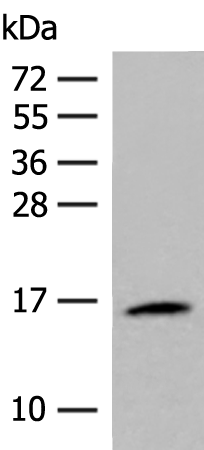
| WB | 咨询技术 | Human,Mouse,Rat |
| IF | 咨询技术 | Human,Mouse,Rat |
| IHC | 咨询技术 | Human,Mouse,Rat |
| ICC | 技术咨询 | Human,Mouse,Rat |
| FCM | 咨询技术 | Human,Mouse,Rat |
| Elisa | 1/5000-1/10000 | Human,Mouse,Rat |
| Aliases | G1P2; IP17; UCRP; IFI15; IMD38; hUCRP |
| WB Predicted band size | 18 kDa |
| Host/Isotype | Rabbit IgG |
| Antibody Type | Primary antibody |
| Storage | Store at 4°C short term. Aliquot and store at -20°C long term. Avoid freeze/thaw cycles. |
| Species Reactivity | Human |
| Immunogen | Fusion protein of human ISG15 |
| Formulation | Purified antibody in PBS with 0.05% sodium azide and 50% glycerol. |
+ +
以下是关于ISG15抗体的3篇参考文献及其摘要概括:
---
1. **文献名称**:*ISG15 as a novel therapeutic target in viral infection and autoimmune diseases*
**作者**:Zhang X, et al.
**摘要**:该研究探讨了ISG15在病毒感染(如流感病毒、HIV)和自身免疫疾病(如系统性红斑狼疮)中的双重作用,提出ISG15抗体可作为疾病诊断标志物及潜在治疗靶点,并验证了抗体在检测患者血清ISG15水平中的应用。
---
2. **文献名称**:*Interferon-stimulated gene 15 (ISG15) conjugation restricts influenza A virus infection*
**作者**:Zhao C, et al.
**摘要**:文章发现ISG15蛋白通过泛素化修饰抑制流感病毒复制,研究利用特异性ISG15抗体检测病毒感染细胞中ISG15的共价结合模式,揭示了其抗病毒机制。
---
3. **文献名称**:*Generation and characterization of monoclonal antibodies specific for human ISG15*
**作者**:D’Cunha J, et al.
**摘要**:该研究首次报道了针对人ISG15蛋白的单克隆抗体制备,验证了抗体在Western blot、免疫荧光及ELISA中的高特异性,为后续ISG15功能研究提供了重要工具。
---
如需具体文献来源(如期刊卷号、页码),建议通过PubMed或Google Scholar搜索标题或作者获取全文信息。
ISG15 (Interferon-stimulated gene 15) antibodies are essential tools for studying the ubiquitin-like protein ISG15. a key component of the innate immune response. ISG15 is rapidly induced by type I interferons (IFN-α/β) during viral or bacterial infections, stress, or cancer. It functions through a post-translational modification process called ISGylation, where ISG15 conjugates to target proteins via a cascade involving E1 (UBE1L), E2 (UBCH8), and E3 ligases. This modification regulates diverse cellular processes, including protein stability, immune signaling, antiviral defense, and DNA repair.
ISG15 antibodies are widely used to detect both free ISG15 and ISG15-conjugated proteins in techniques such as Western blotting, immunohistochemistry, and immunofluorescence. They play a critical role in investigating ISG15’s dual roles: as an intracellular modifier modulating host defense pathways and as a secreted cytokine influencing immune cell communication. Researchers also utilize these antibodies to explore ISG15’s involvement in diseases, such as autoimmune disorders (e.g., lupus), viral infections (e.g., influenza, HIV), and cancer, where dysregulated ISGylation is often observed.
Commercial ISG15 antibodies are typically raised against human or mouse ISG15 and validated for species specificity. Their applications extend to studying interferon signaling dynamics, pathogen-host interactions, and therapeutic targets. However, cross-reactivity with ubiquitin or other ubiquitin-like proteins requires careful validation using ISG15-knockout controls.
×